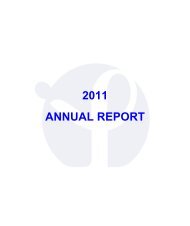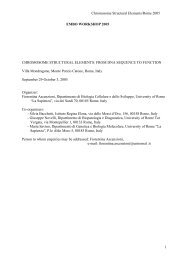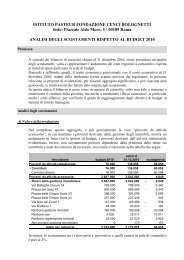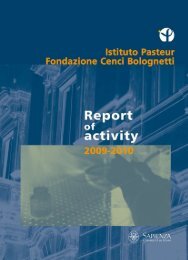download report - Istituto Pasteur
download report - Istituto Pasteur
download report - Istituto Pasteur
You also want an ePaper? Increase the reach of your titles
YUMPU automatically turns print PDFs into web optimized ePapers that Google loves.
P a r t i c i p a n t s :<br />
Livia Di Renzo, researcher; Giulia Matusali, PhD student;<br />
Alessandra De Leo, Giuseppe Arena, graduate students;<br />
Egidio Lacanna, Claudia Stecca, Valentina Scalise, undergraduate<br />
students.<br />
C o l l a b o r a t i o n s :<br />
The Wistar Institute, Philadelphia, USA (Prof. Paul M. Lieberman).<br />
Report of activity<br />
Resveratrol (3,4’,5-trihydroxy-trans-stilbene), a<br />
polyphenolic natural product present in grapes and<br />
other fruits, has been shown to possess chemopreventive<br />
properties against several cancers, heart diseases,<br />
ischemic injuries and inflammation. Moreover,<br />
increasing evidence in the literature indicate that<br />
resveratrol is able to exert anti-viral activity by interfering<br />
with several intracellular signaling and to synergistically<br />
enhance the effects of antiviral drugs.<br />
In this study we are investigating the effects of<br />
resveratrol on Epstein Barr Virus (EBV) infection.<br />
EBV, the ethiologic agent of infectious mononucleosis,<br />
is associated with several types of malignancies<br />
of epithelial and lymphoid origin including nasopharyngeal<br />
carcinoma (NPC), Hodgkin’s lymphoma,<br />
Burkitt’s lymphoma and many lymphoproliferative<br />
diseases arising in immunocompromised individuals.<br />
In each of these tumors, the selective expression of<br />
six nuclear antigens (EBNA1, 2,3A, 3B, 3C and LP)<br />
and three membrane associated proteins<br />
(LMP1,LMP2a and 2b ) characterize different forms<br />
of latency programs (I, II and III). The lytic phase,<br />
ending with the production of new viral particles,<br />
expands the pool of infected cells favoring the<br />
spread of viral infection.<br />
For the purposes of this project, EBV-infected cell<br />
lines, showing different latency programs, have been<br />
treated for 24 hours with 30 µg/ml of resveratrol, a<br />
concentration chosen because able to affect cell pro-<br />
Principal investigator: Elena Mattia<br />
Professor in Microbiology<br />
Dipartimento di Scienze di Sanità Pubblica<br />
Tel: (+39) 06 49914608; Fax: (+39) 06 49914626<br />
Elena.Mattia@uniroma1.it<br />
121<br />
New antimicrobial and antiviral agents - AREA 6<br />
Effects of resveratrol on Epstein-Barr Virus latent and lytic phases<br />
of infection<br />
liferation without causing significant loss of cell viability<br />
or marked morphological alterations. Burkitt’s<br />
lymphoma-derived Raji and Jijoye cells (latency III),<br />
Akata (latency I) and Hodgkin’s derived RPMI6666<br />
cells (latency II) have been incubated with resveratrol<br />
and the effects on the cell cycle have been studied<br />
by analyzing in flowcitometry the distribution of<br />
the cell population in the different phases, as well as<br />
by measuring in Western blot the expression levels<br />
of molecules functioning as regulators of the cell<br />
cycle. We have found that the polyphenol affects cell<br />
cycle progression by blocking Raji and Jijoye cells in<br />
the G1 phase and by inducing apoptosis (sub G1<br />
events) in Akata and RPMI 6666 cells. To evaluate<br />
the extent of apoptosis, the percentages of annexin<br />
V-positive cells have been determined; we found that<br />
after 24 hours incubation, resveratrol induced apoptosis<br />
in all cell lines with percentages varying<br />
between 30 to 60%. In agreement with the cytofluorimetric<br />
data, the levels of the cell cycle regulators<br />
CDK1, CDK2 and cyclin A dramatically decreased<br />
while cyclin-dependent-kinase inhibitors p27 was<br />
strongly up-regulated. To investigate whether the<br />
resveratrol exerts a direct effect on EBV expression,<br />
we measured the levels of transcription of EBV<br />
latent genes in the cells treated with the polyphenol.<br />
The results of RT-PCR experiments carried out on<br />
four EBV-positive cell lines incubated for up to 24<br />
hours with resveratrol indicated that latent EBV<br />
genes were strongly down-regulated independently<br />
of the latency program, while the levels of the b2microglobulin<br />
remained unchanged. From these<br />
results it is possible to conclude that resveratrol is<br />
able to affect both cell cycle progression of the host<br />
cell, as well as EBV latent gene expression.<br />
While a very restricted subset of tumor cells produces<br />
virions by lytic infection, EBV productive cycle<br />
represents the main EBV infection pattern in the<br />
plasmacells of patients with infectious mononucleosis.<br />
In vitro, EBV lytic cycle can be induced by the<br />
addition to the cells of TGFb, sodium butyrate,








